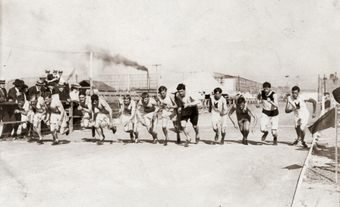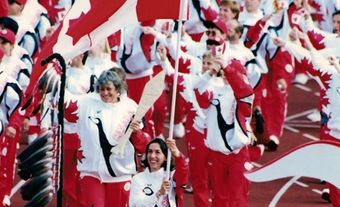The North American Indigenous Games (NAIG) — in French Jeux Autochtones de l’Amerique du Nord (JAAN) — are both a multisport event and a cultural celebration involving young athletes from across the continent. The 10th games were held in Nova Scotia. Nova Scotia is part of Mi’kma’ki, the traditional and ancestral territory of the Mi’kmaq people. They took place at 21 venues in Halifax, Dartmouth and the Millbrook First Nation (see First Nations in Nova Scotia) from 15 to 23 July 2023. More than 5,000 athletes, coaches and team staff from over 755 Indigenous Nations (see Indigenous Peoples in Canada) attended, supported by 3,000 volunteers.

Background
Indigenous Peoples have been playing games of endurance, dexterity, luck and for ceremonial purposes for millennia. Such games have always emphasized a deep-seated relationship to the land, water and air and usually had a spiritual connection to the Creator (see also Religion and Spirituality of Indigenous Peoples in Canada).
The idea for an Indigenous Peoples games began in the 1970s. Originally, the games were held intermittently. However, as of NAIG 2023, they will be conducted every four years. The games were to take place in Nova Scotia in 2020. Due to the COVID-19 pandemic, they were postponed.
History
NAIG sports competitions and accompanying cultural events have been held as follows:
|
NAIG No. |
Dates |
Location |
Sport Participants/ No. of Sports |
Winner |
|
I |
1–8 July 1990 |
Edmonton, Alberta |
3,000/15 |
Team Saskatchewan |
|
II |
18–25 July 1993 |
Prince Albert, Saskatchewan |
4,400/15 |
Team Saskatchewan |
|
III |
29 July–6 August 1995 |
Blaine, Minnesota |
8,500/17 |
Team Saskatchewan |
|
IV |
3–8 August 1997 |
Victoria, British Columbia |
5,000/16 |
Team Saskatchewan |
|
V |
25 July–4 August 2002 |
Winnipeg, Manitoba |
6,500/16 |
Team Manitoba |
|
VI |
28 June–9 July 2006 |
Denver, Colorado |
8,000/16 |
Team Saskatchewan |
|
VII |
3–10 August 2008 |
Cowichan, British Columbia |
4,700/14 |
Team Saskatchewan |
|
VIII |
20–27 July 2014 |
Regina, Saskatchewan |
5,000/15 |
Team British Columbia |
|
IX |
16–23 July 2017 |
Toronto, Ontario |
4,800/15 |
Team British Columbia |
|
X |
15–23 July 2023 |
Halifax, Nova Scotia |
5,000+/ 16 |
Team Saskatchewan |
Cultural events accompanying the games have incorporated ceremonial runs, traditional powwow, artists, dancers, musicians, exhibitions by cultural groups and other Indigenous activities. The 2023 games included a cultural village on the Halifax Common.
Sports
All sports have male and female divisions. Some sports include three age categories: under 14, under 16 and under 19. The 16 sports included in the 2023 games were 3D archery, athletics, badminton, baseball, basketball, beach volleyball, box lacrosse, canoe/kayak, golf, rifle shooting, soccer, softball, swimming, volleyball and wrestling. Three of these sports, 3D archery, canoe/kayak and lacrosse, are Indigenous sports that each have a special opening ceremony.
Teams
Teams from Canada for NAIG 2023 represented all provinces and territories. They were from Newfoundland and Labrador, Prince Edward Island, Nova Scotia, New Brunswick, Eastern Door and the North (Quebec), Ontario, Manitoba, Saskatchewan, Alberta, British Columbia, Yukon, Northwest Territories and Nunavut. In addition, athletes from 12 different regions of the United States, representing 32 states, also competed.
Logo
The logo for NAIG 2023 consists of three stylized paddlers in a traditional canoe. The figures and their paddles are highlighted in yellow, red and blue.
Medals
Customary gold, silver and bronze medals were awarded at NAIG 2023. The designs were unveiled at the Millbrook First Nation on 17 January 2023. They feature several traditional Mi’kmaq drawings. One of these depictions is of an eight-pointed star inspired by petroglyphs (see Pictographs and Petroglyphs) found in nearby Bedford, Nova Scotia. The medals also include drawings of a symbol representing the word L’nu, which means the “people” and is the word the Mi’kmaq use to describe themselves. There are also representations of curved designs commonly found in Mi’kmaq cultural drawings. These designs represent the things that grow and happen when individuals follow their dreams. The medal ribbon features the games logo and the word Kjipuktuk, which in Mi’kmaq means “great harbour,” the Mi’kmaq name for Halifax.

 Share on Facebook
Share on Facebook Share on X
Share on X Share by Email
Share by Email Share on Google Classroom
Share on Google Classroom

